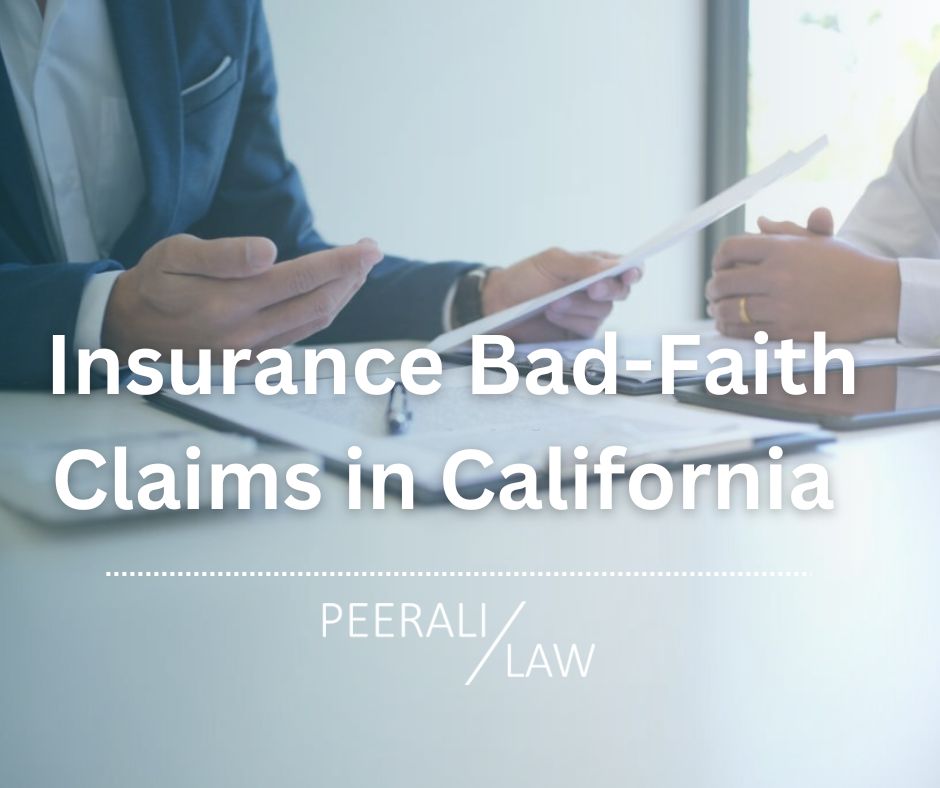
As consumers, we pay into insurance policies in the hopes that if an unexpected event or accident occurs, we can file a claim for compensation to cover damages or be protected from personal financial exposure. Insurance bad faith is complicated. This blog provides a general guideline into bad-faith insurance California laws, what you need to know, and how we can help.
Contact us to explore how our team can assist you.
What Is Bad Faith?
Bad faith is a legal term used in many areas of the law. Insurance bad faith refers to an insurance company’s actions or inactions relating to a claim. When a policyholder buys an insurance policy, this constitutes a legal contract. If the insurer fails to uphold their legal obligations under the policy terms, they may have acted in bad faith.
First-Party Claims vs. Third-Party Claims
When discussing insurance bad faith, knowing there are two types of claims is essential.
First-Party Claim
A first-party claim is one you would make with your own insurance company. For instance, if a tree from your backyard falls on your home, you would file a claim with your homeowner’s insurance policy.
Third-Party Claim
A third-party claim is one where someone else files with your insurance company. Perhaps the most common example is if you are at fault for a car accident. The other party will file a claim against you, and your insurance company must defend the claim and, if appropriate, pay the claimant damages.
Legitimate Reasons an Insurance Company May Deny Your Claim
Not every denial will give rise to a bad-faith claim. There are legitimate reasons why an insurance company may deny a claim.
Was it Bad Faith?
The elements for insurance bad faith depend on the disputed claim type and whether it is a first-party or third-party claim.
Examples of bad-faith conduct include:
- Refusing to give a reason for denying a claim,
- Failing to fully and properly investigate a claim,
- Offering a lowball settlement that does not properly compensate the victim under the policy,
- Refusing to approve or pay a valid claim,
- Unnecessarily delaying claims,
- Failing to pay any approved claims without delay,
- Failure to defend,
- Failure to settle, and
- Negligent handling of the case.
Our California insurance bad faith attorneys can help you determine if you have a valid bad faith claim.
How Do I File an Insurance Bad-Faith Claim?
Filing a bad-faith claim can take time and effort. It often takes a lot of preparation and a load of paperwork. Let’s look at some steps you can follow.
- Gather all relevant documentation and information,
- Review your policy closely,
- Keep a record of the denial,
- Appeal or request a review of your claim,
- Provide a written demand to the insurance company,
- File a complaint with the California Department of Insurance, and
- File a formal claim against the insurance company.
Let our insurance bad-faith claim lawyers in California guide you step-by-step through the process.
Recovering Damages from Insurance Bad Faith
If your bad-faith claim is successful, you may be eligible to recover damages. The type and amount of damages will vary from case to case.
Compensatory damages can include economic and non-economic damages arising from the acts of bad faith. This can include the following:
- The amount the policyholder is owed for their original claim,
- Pain and suffering,
- Emotional distress,
- Costs of repair, and
- Costs of any medical expenses incurred.
In some cases, you may also be entitled to attorney fees.
Punitive Damages
In some cases, you may be able to seek punitive damages if there’s evidence the insurer’s bad faith was willful or egregious.
California Bad-Faith Insurance Law
In most states, you can typically proceed with a lawsuit based on one or two circumstances.
Breach of Contract
An insurance company has a legal duty to uphold its obligations under the terms of the policy.
If they fail to do so, they breach the contract and may be liable for damages. A bad-faith breach of contract claim, generally, must be brought within four years from the date of the wrongful action.
Tort Claim
If the insurance company’s conduct harmed you, you may also pursue a tort claim within two years from the date of the wrongful conduct.
Peerali Law: Bad-Faith Insurance Claims Attorneys
If you believe an insurance company has acted in bad faith, you may have legal options. We strongly encourage you to consult an experienced insurance attorney before proceeding with a bad-faith insurance claim in California. At Peerali Law, we are members of the Los Angeles Consumer Attorney Association and are always available to assist you. Contact us today!


